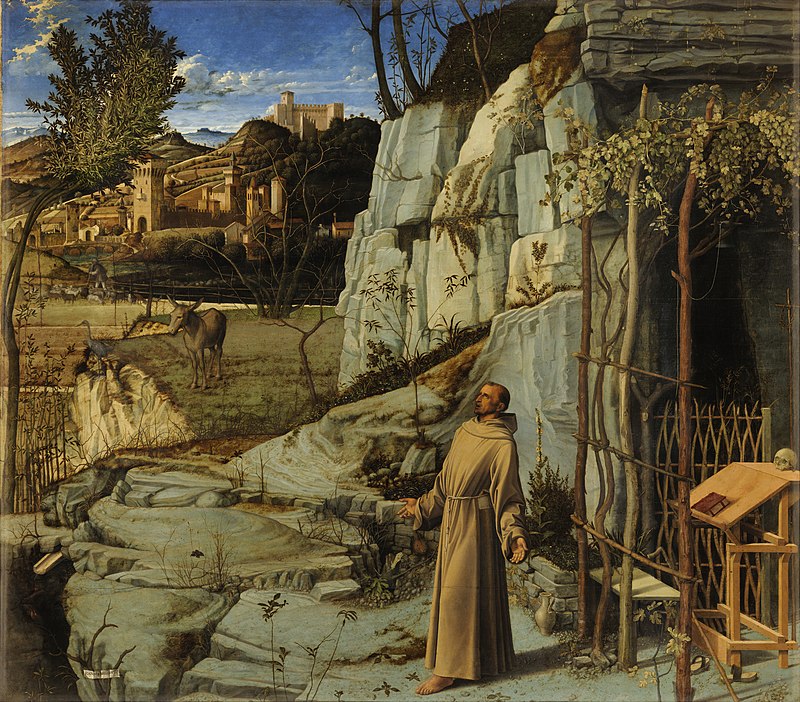Last Easter Sunday we had to hold our service in the park. I remember listening to the sermon with my bare hands sinking into the grass whist birds chirped overhead. I had felt grace before, but never so freely integrated in nature. As I listened to our pastor, I thought about Giovani Bellini’s masterpiece, St. Francis In Ecstasy. The fifteenth-century oil painting depicts a moment of natural serenity, much like my own experience in the grass. Bellini presents Francis as so overcome by the Lord that the patron saint of ecology kicks off his sandals to lean further into his own. The azure of the sky complements the earthy umbers jutting out beneath distant city walls. Bellini’s generous use of colour brings out the vividness of this revelation to intimate how pursuing faith can both be beautiful and yet so simple.

St. Francis in Ecstasy (c.1480)
Everything about that Easter morning seemed perfect but still something was holding me back from following in St. Francis’ enlightened footsteps. This was unusual of my regular experiences at church. Since I started to take faith more seriously five months ago, I have felt a similar sense of peace to the one etched in Francis’ expression. It is always on my walks home after Sunday service, when I am slowly seeping back into reality, that the world seems to grow that bit brighter; just like the colours in St. Francis.
So when my friend who I had confided to after the Easter service made me flip to Romans 7:10 which interrogates the speciousness of sin, the tightening in my stomach came as some surprise. This verse was written by Paul whose letter reads almost as a confession during his missionary travels. Paul here describes the challenge of wrestling between earthly desires and his soul by suggesting, that the very commandment [which he believed] was intended to bring life actually brought death.
All week I’d been feeling nervous about an upcoming date and this was how my friend was advising me. While I was well aware that sex before marriage was a deal-breaker in my ministry, I still had questions surrounding chaste intimate relationships. And what about queer chaste intimate relationships? Or was that going too far?
As we read Paul’s turmoil over sin, I began to sense that my friend wasn’t accepting of me going on this date. She said “it would pull me further away from God”. I didn’t know if she meant dating in general or the fact that I was a lesbian; or maybe both? I dared not ask.
Thoughts now spiralling, I quickly got on a call with another Christian friend to ask what she thought. I reckoned I ought to get more than one opinion on this issue since no one interpretation of scripture will ever be the same. I was sorely disappointed.
The advice from this friend (let’s call her Jane) was worse. Apparently being gay wasn’t sinful, but acting on those feelings was a no-go. “Sex within a heterosexual marriage is sanctified”, Jane said, “anything else is a sin”. Even same-sex emotional intimacy was discouraged at Jane’s own church (we worshipped at different branches) since the “temptation would just be too great”. Jane even mentioned there were a lot of gay people at her Anglican church and that they sometimes led in prayer. Her Christian community clearly didn’t condemn gay people, no, they just condemned gay acts.
I was totally stumped.
What was the point of being gay if you couldn’t actually be gay? I thought as I hung up. If I hadn’t been so shocked I would have asked if I could talk to those gay people at her church. She had made it sound all-so-simple, but what else did I expect from Jane’s own straight perspective? One thing was certain, I had not ploughed through early teenage angst only to cripple back into the closet of shame six years later. God would never want me to return to that.
Listening to Jane reminded me how privileged I am to live in the UK as a queer Christian woman. While I might not always get to hear what I want, I don’t need to worry so much about my physical safety and can distance myself from such views whenever I wish. Sadly this is not the reality of most people. In my country in Poland, where the government rules closely with the church, being openly gay is extremely dangerous. According to the Archishop of Kraków, “LGBT ideology” is a “rainbow plague” likened to Nazism. I remember going to Krakow’s Pride march of 2020 whilst visiting family and seeing the police protecting anti-gay protesters instead of those being discriminated against with outrageous slurs. Still, this didn’t diminish the sea of rainbow flags which enveloped the opposition’s dull black boards, completely drowning them out.
Sometimes it feels like religion has forgotten its own origins: there was once was a time when being a Christian was radical too. Even by today’s standards, Jesus himself would be a difficult figure to accept. To the then rigid hierarchies of Roman government and wealthy Pharisee priests, Jesus’ advocation for the inherent equality amongst all people no matter who they were or what they’d done did not sit so well. Love was at the forefront of everything Jesus taught. “If I have a faith that can move mountains, but do not have love”, says Jesus, “I am nothing”.
Of course Jane’s Anglican views were not nearly as extreme as the outright homophobia I’d experienced in Poland, but still I wondered how constructive Jane’s beliefs were. I found I could no longer hide behind other people’s relationships with God. I now had to face what I believed in.
If we all have different interpretations of religion, I asked myself on the way home, how do you know if you’re in the “right”, because wasn’t that what faith was all about? How can anyone possibly discern sin from purity? And to judge others, especially when it comes to something already so complex like feelings, that also sounded way too unfair. I dreaded the prospect of having to choose between my queer identity and my faith; two aspects of me that were never going to change.
While I believe every word of the Bible is “God-breathed”, I accept a lot of its original meanings have been buried under layers of history and lost in translation. From what I have studied, I see my faith most explicitly in John 3:8. Here Jesus describes the Spirit as the wind which ‘blows wherever it pleases. You hear its sound, yet you cannot tell where it comes from or where it is going.’ To me the spirit of this passage softly resounds throughout Bellini’s painting where faith is shown to manifest both in the body as in nature. Just as a natural element flows of its own logic, Jesus tells us that ‘it is the same with the Spirit’. Nature and humans are not so distinct because both have been created in God’s image and this is exposed on Bellini’s canvas to suggest that faith need not concern itself with vague ideologies or outdated social codes. Instead, humanity is compelled to better understand our place in this world.
We’re all bound to make mistakes, whether we are religious or not. It’s foolish to think that by embracing faith, one is guaranteed a life of total faithfulness. No one is ever justified of bullying – to do so in the name of “God” is total hypocrisy. But just like any other relationship, getting to know God takes time. Instead of worrying about what might draw me from Him, I am now learning to focus on what will bring me closer. Perhaps I should have realised this all along, but a good relationship with God can only come from a good relationship with self.
The hardest thing is that although my ministry will show me love no matter what, being gay is still “outside of God’s design” according to their books. These people have been some of my closest friends and they will never be able to give me their blessing should I end up in a relationship with another woman. On the phone to Jane I’d croaked out if I was “unnatural” as Paul describes of homosexuals (gay and lesbian) further on in Romans. The silence on the other end of the line crackled with white noise.
“I wouldn’t call it “unnatural” but …”
It’s difficult to believe personal repression will lead one closer to God. In fact, studies have shown queer Christians are twice as likely to leave organised religion because of disapproval. I didn’t want that to happen to me. I hadn’t gone through months of spiritual awakening only to abandon fellowship altogether. Luckily, unlike my other queer friends, I didn’t need to deal with suspicious glances or nasty side comments during worship. I just needed to deal with God.
And I wish I could say that we always see eye to eye. I’m still getting to know His character, and something tells me it will take more than a lifetime to find out. Funnily enough, these doubts have only reaffirmed my belief. My faith is stronger now that it’s led me places I never thought I would go. Before I would have scoffed at the idea of going to a gay-friendly church, or even talking so openly about faith and sexuality like this. But I have decided to speak now because queer people of faith need more visibility. It’s always tricky to talk about tradition and ancient (sometimes outdated) scriptures alongside huge taboos like sexuality. But burying our heads in the sand will not bring any good. I know it didn’t for me.
It is not “unnatural” to live out as gay and still be Christian. I refuse to choose between these two enriching parts of my life. Just as I imagine St. Francis was before his revelation, I was also shut away in darkness. The skull sitting on his desk conveys the perfect memento mori, reminding us how much life we have yet to live with God. In my mind’s eye I see myself in Francis, possibly at his work station studying the Bible. I wonder what could have caused him to turn around? Perhaps it was a gust of wind. As the Spirit brushes the man’s shoulder, he gently rises and steps into the light. Neither one of us knew how we found ourselves on this path and I’m sure both of us were just as frightened. But I don’t believe God wants to stop our questioning. He just wants us to keep believing.

